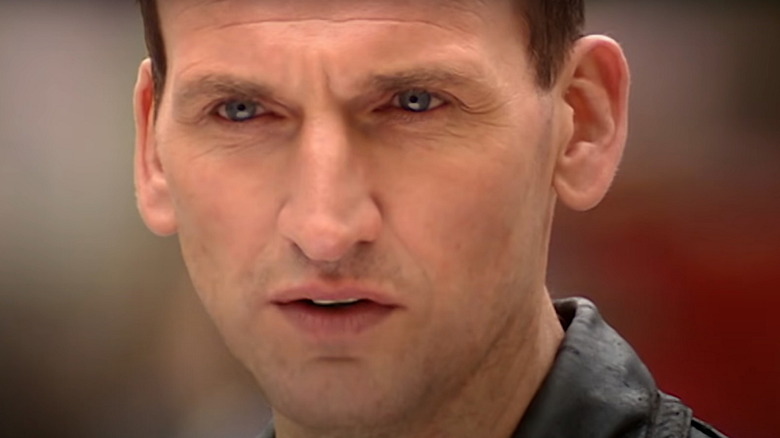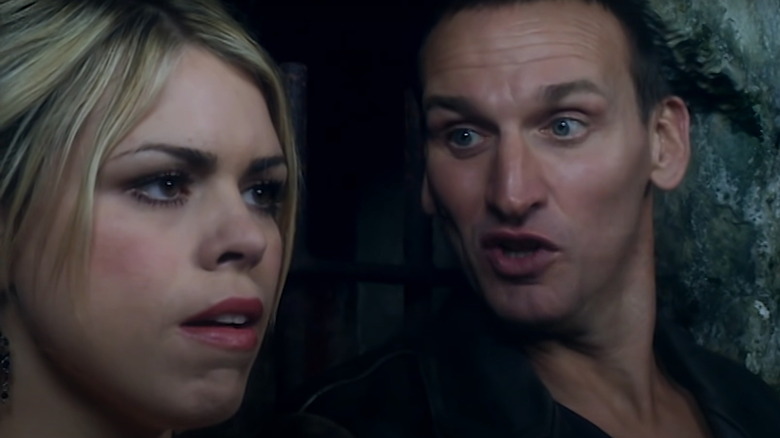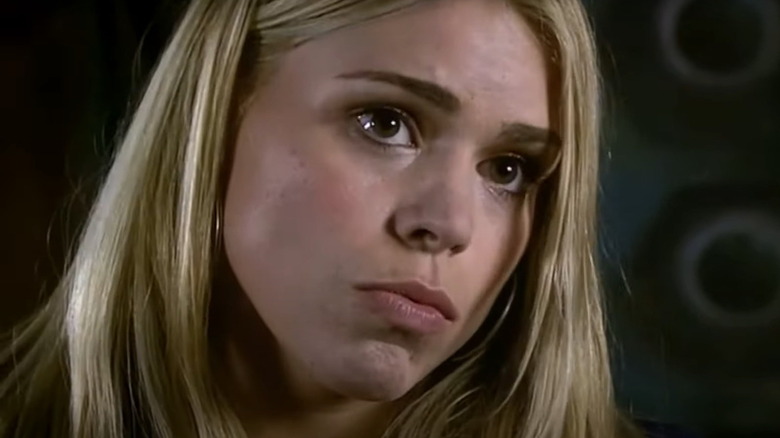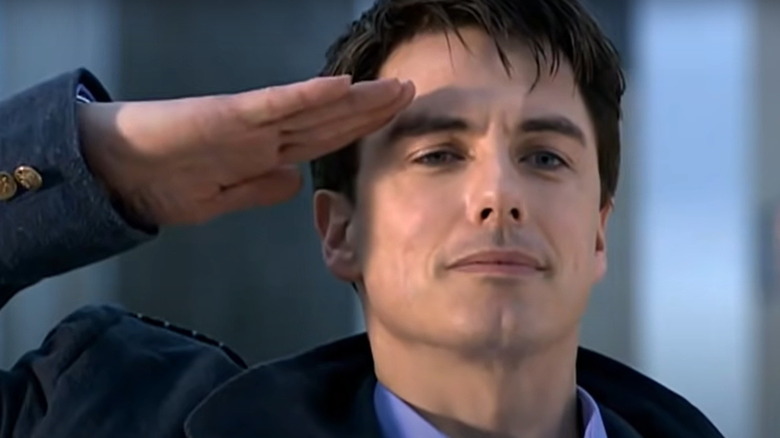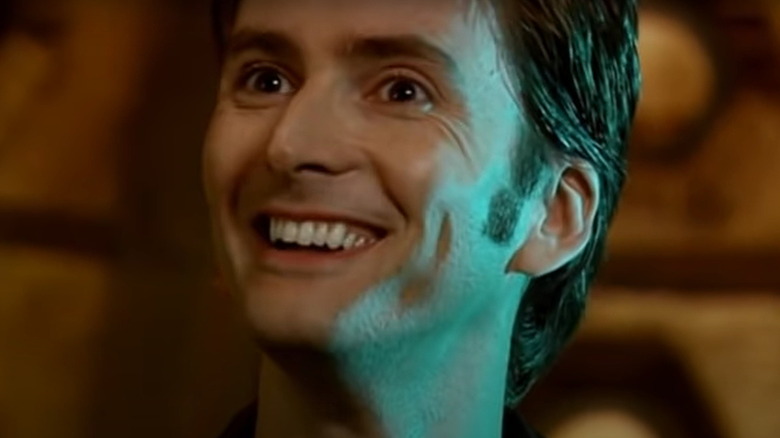The Ending Of Doctor Who Season 1 Explained
BBC's 2005 reboot of the science-fiction juggernaut "Doctor Who" is, as of this writing, 13 seasons (series, if you're British) deep with no plans on stopping. And why would they? The core premise of the show permits BBC to cycle in new star performers whenever they require and considering that a time-traveling spaceship is involved, the adventure potential is quite literally endless. Of course, while these factors allow for breathing space in the writer's room, it can get a little confusing for viewers, especially when you realize "Doctor Who" isn't above a few retcons here and there.
That's where we come in. Time might be a big, messy ball of wibbly-wobbly, timey-wimey ... stuff, but your understanding of the Doctor's adventures doesn't have to be. Unlike those lucky few with a non-linear comprehension of time, we don't have a TARDIS, and sometimes we are incredibly dumb, so we're definitely starting at the beginning. Here's a full breakdown of the first season's conclusion. Allons y, it's about to get weird.
Here's a quick space opera refresher course
To understand what's going on, you might need a quick refresher. The central figure in "Doctor Who" is The Doctor themself. Season 1 of the 2005 reboot features the Ninth Doctor (Christopher Eccleston), a Gallifreyan Time Lord with the improbable ability to regenerate his body. For clarity, Gallifrey's his planet, Time Lord's his race, and he's got a TARDIS (Time And Relative Dimension In Space) that can take him anywhere, anywhen.
His primary traveling companions for the first season are Rose Tyler (Billie Piper), an ordinary woman working in ordinary retail, and Captain Jack Harkness (John Barrowman), an ex-Time Agent and an incorrigible flirt. Rose, unable to resist a mysterious man in a leather jacket, travels with The Doctor for the entirety of the season, but the duo only picks up Jack around the halfway mark after they find him stranded in London in 1941, which is, arguably, a really bad time to be there.
The trio's adventures come to a screeching halt when the Doctor realizes that Daleks, an invasive alien race of fragile squids piloting invincible trash cans, had survived the infamous Time War against the Time Lords, and are preparing to launch a new armada upon the unsuspecting people of Earth.
The Doctor's love for Rose conquers his trauma
Now, let's fast-forward quickly, to give additional context to what plays out onscreen in the Season 1 finale.
In the much later 50th Anniversary Special, "The Day Of The Doctor," it is revealed that an unnumbered reincarnation of the Doctor, known as the War Doctor (John Hurt), made the choice to sacrifice his people and his planet to stop the Daleks from destroying all of space and time. Also revealed in 50th Anniversary Special is that the Ninth Doctor is the reincarnation which appears directly after the War Doctor, so perhaps you can appreciate how mentally jarring it would be for him to realize that the Daleks not only survived the Time War ... they also survived him, meaning that the only casualties of his horrific act were his own people.
With that in mind, the meme regarding Eccleston's Doctor running away from his problems seems a little crass, doesn't it? He has some serious, legitimate trauma to deal with. Fortunately, the Doctor's pell-mell sprint from mental stability crashed him directly into Rose, who insisted on helping everyone they met. Her very presence forced him to act again. She made him a better Doctor, the kind of Doctor he wished he could have been for his own people. It is perhaps for this very reason that he fell in love with her, and it's definitely why he chose to defend humanity against the Daleks in the Season 1 finale.
Rose inadvertently creates the Face of Boe
After the Ninth Doctor decides to face the Daleks again, he locks Rose inside the TARDIS and sends her back to the 21st century, thereby removing her from the danger zone and stranding himself in it. Undeterred by menial obstacles like an uncontrollable time machine, Rose breaks into the heart of the TARDIS, a sentient energy source, which gives her god-like powers that she uses to return to the future where the Doctor and Jack are still fighting the Daleks.
Now, the Doctor chooses to fight the Daleks with his brain but Jack chooses to fight the Daleks with his brawn (read: guns). Unfortunately, that doesn't go so well for him, and he falls to laser fire. Thanks to Rose's new connection to the TARDIS, though, death is only a temporary state for Jack who, much to his surprise, wakes back up. For him, the battle is long over, and the Doctor and Rose were gone. Jack soon realizes that his new life is different than the one that came before — he can't seem to stay dead, a fact that will eventually get explored in more detail in his spin-off series "Torchwood."
But Rose's cure proves to be more than a crude approximation of reincarnation. Thanks to her, Jack becomes virtually immortal and, eventually, after billions of years, the Face of Boe, a mysterious and respected alien figure that the Doctor meets on more than one occasion. It's later revealed that the Doctor (although it's not specified whether it's the ninth or tenth) knew that Rose had brought Jack back to life, and chose to leave him behind, considering him to be unnatural.
Rose inadvertently creates the Tenth Doctor, too
The course of the finale is shaped by all of the things that Rose accomplishes by connecting with the Heart of the TARDIS. Aside from saving Jack, she also uses her omnipotence to scatter the words "Bad Wolf" (a message that cropped up in every episode prior) across the universe as a signal to her past self. Finally, in a move that would make Thanos proud, Rose atomizes the entire Dalek armada with a wave of her hand. That kind of power comes with a price, though, and the Heart of the Tardis begins to consume Rose. Upon realizing this, the Doctor siphons the power out of her with a single kiss in the weirdest act of romance — or should we say reverse CPR? — even seen on TV. He then releases the energy back into the TARDIS, but the transfer proves too much for him, too.
The Ninth Doctor's final words attempt to reassure Rose that he won't really die, only change a little. As he's being purposely vague, Rose is understandably not comforted by this. Then, in a burst of golden light, he transforms into the Tenth Doctor (David Tennant), who ends the season with a crazed smile.
It seems that a major act of any given Doctor shapes who they become next. If Eccleston's Ninth Doctor was a trauma response to Hurt's War Doctor atrocities, then it's possible that Rose's heroic influence shaped the more decisive personality of Tennant's Tenth Doctor.
